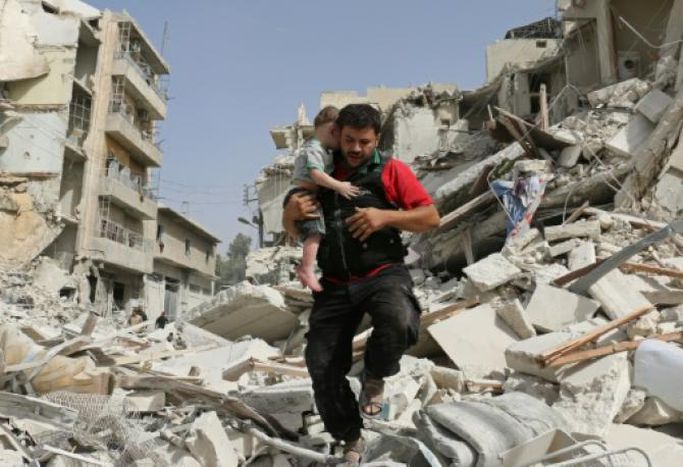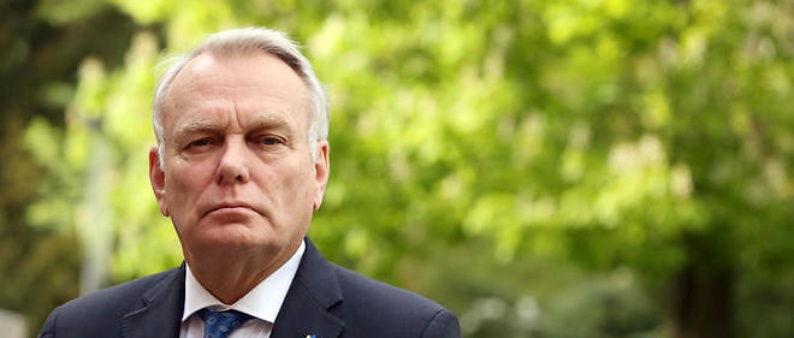
Alep is the 21st century Guernica
Published on
Translation by:
 Viveka Anandane
Viveka Anandane
French Minister of Foreign Affairs, Jean-Marc Ayrault spoke up last week at the school of international affairs of Sciences Po in Paris, about the Syrian crisis. He spoke of the city of Alep as the 21st Century Guernica :

Syria is a country of martyrs. The city of Alep could as well become the symbol of this crisis which keeps on triggering catastrophic effects : I have called that the 21st century Guernica.
So what choice does the syrian people have left ? Escape. This is what the neighbour countries and Europe have been seeing for the last five years, with now almost half of the population thrown on the roads of exile or moved from their home.
Death. And the dead are already being counted by hundreds of thousands in this conflict, which, at people's scale, can be compared to the most blood-shedding wars of the last century.
Radicalization. This is unfortunately what happens to some rebel groups whom, confronted with the systematic violence of Assad's regime, are brought to get closer to terrorist groups. This is a vicious circle that the supporters of Damas are continuously feeding, having the perfect knowledge of the consequences and in the aim of bringing Syria up to a morbid face-to-face between two brutalities : one created by the regime and the other one by terrorism.
Neither Assad's regime, nor Daech or Al-Nosra, the syrian branch of Al-Qaïda has embarrassed itself with any principle in this mechanical process and barbaric elimination of people who think differently, pray differently or are simply bothering them because they are at the wrong place. This is the hideous show of the worst cruelty which mankind is capable of. And it is happening there, on the other side of the Mediterreanean sea.
What have we been doing, for the past five years throughout which this conflict has been raging ? We have been collectively weak, we must dare recognize it, and I am doing it right in front of you. Peace could have been brought back if - collectively, I repeat- we had known how to create a coalition strong enough to hit those responsible for the Ghouta chemical attack during the summer 2013. At that time, us, France, wished for that coalition to happen. But some thought this conflict to be so far away from us and not enough linked to our vital interests for us to intervene. The United States of America hesited. The British renounced. We have since then witnessed the consequences of those doubts. War in Syria has generated a massive flux of refugees who have now become our problem. It has favoured the birth and growth of an unprecedented international terrorism nest which serves as an underground cell or source of inspiration for terrorism attacks all over the world.
Today, this war in Syria is useful for Russia to impose itself as a great power, to illustrate its ability to resist a coalition which is not even directed against it. Yet, by supporting and encouraging Assad, Russia is not only taking the risk of being an ally in war crimes, it also contributes to an undertaking that is making the rest of the Middle-East, as well as Turkey and Europe become unstable and this could rebound and affect Russia itself.
To all those, including those in Paris, who have been telling us for months that we just have to align ourselves behind Moscow to tackle the syrian issue, my answer is thus : you are wrong. See the results of the efforts made by John Kerry who tirelessly and with all the sincerity of his heart tried, to negociate a truce with Sergueï Lavrov, in exchange for a cooperation in the struggle against Jabhat Al-Nosra. This truce only held up for a few days and the syrian regime continued on its march towards Alep, with the consent and support of both Russia and Iran.
We must thus have the courage brought to us by our lucidity to admit the fact that the world is facing, in Syria, one of the worst situations that it has known since the end of the second world war. Does that mean we should resign ourselves or confine ourselves - and let Moscow confine itself - in a new confrontation, where the borders of each empire would again be sacrified to the benefit of the wishes of powerful nations ?
Syria can not wait anymore. We can not wait anymore. These fights must cease for once, and this, first in Alep. This is what we are currently struggling to obtain from the United Nations Security Council which is meeting at the very moment I am addressing you. I have also suggested last week in New York, to implement a control mecanism to ensure a collectivist follow-up of the cease-fire, which would be the only way to create the trust we are missing. Humanitarian aid should get to the needy who are currently deprived from it for months sometimes. Afterwards, a political process should work towards building a peaceful future for Syria. That kind of future is possible. This is necessary if we want the international community to unite all its forcing in the fight against terrorism.
With Syria, the world is at a moment of revealing truth. The balance of powers in the world and in the future of our international system is also at stake.
An exhibition about the heroic city of Alep is giving tribute to syrian people's resistance (Video in French) :
Translated from Alep est le Guernica du XXIe siècle


